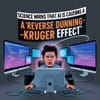A recent article on Inc. reports research suggesting that people who believe they’re highly skilled at using artificial intelligence (AI) tools may actually be more overconfident than novices. Rather than the classic Dunning‑Kruger effect—where low-skill individuals overestimate their ability—this “reverse” version shows that those with greater AI literacy might overrate their competence the most.
In one referenced study from Aalto University in Finland, participants completed complex logical reasoning tasks, some assisted by large language models (LLMs), and then estimated their own performance. Surprisingly, those who were more familiar with AI tools reported higher confidence despite making similar or more errors than less-familiar peers. The research suggests that increased familiarity didn’t improve self-assessment accuracy.
Another key finding: many users of AI tools don’t critically evaluate or verify the outputs. The article cites a trend analysis showing that up to 92% of people didn’t check AI-generated answers, relying instead on the tool’s plausibility rather than correctness. This deepens the risk of overconfidence, especially among users who feel competent but may not be.
The implication is significant: as organisations and individuals increasingly adopt AI in work and decision-making, believing you’re “good at AI” may not mean you are good, especially at evaluating its limitations. The piece argues for greater humility, more rigorous verification of AI outputs, and structured training in not just tool-use but tool-critique.


